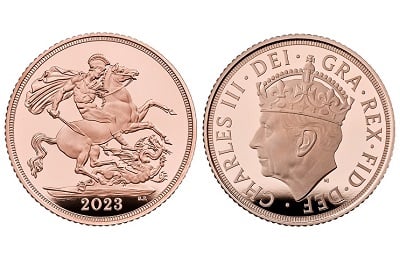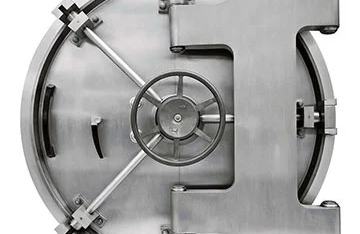What's inside a catalytic converter?
For investors in platinum or palladium, it is vital to know what is being used inside a catalytic converter. As we go on to explain, the price of both metals is almost solely driven by catalytic converters, and any changes to this market could have far-reaching implications for either metal.
The Converter:
A vehicle's catalytic converter controls and reduces toxic exhaust gases and pollutants, such as nitrous oxide. These are released by the combustion that takes place in an engine. Inside it is a honeycomb set of passageways or small ceramic beads, coated with a catalyst. The large number of passages allows for the maximum amount of surface area contact between the gases and the catalyst.
At high temperatures, a chemical reaction takes place which filters out the worst of these exhaust fumes. A catalyst helps to make this chemical reaction more efficient, and speeds it up.
A typical catalytic converter for a vehicle exhaust.
In addition to traditional vehicles, catalytic converters are common in all diesel or petrol-driven internal combustion engines, such as those in electrical generators, forklifts, mining equipment, and locomotives. This means they are widespread, and vital in keeping air pollution to a minimum, so the chemicals inside a catalytic converter also need to be carefully selected.
What metal is in a catalytic converter?
Copper, nickel, cerium, iron, manganese, platinum, palladium and rhodium all have the chemical composition needed to be catalysts in exhaust systems, but the first five are all either too soft, or corrode too easily to be effective catalysts. This leaves platinum, palladium, and rhodium, but as the most expensive of the
platinum group metals,
rhodium is far too costly. This whittles the list down to two: platinum and palladium.
Platinum and palladium are both extremely heat resistant, and both are also very strong and long-lasting. They have both proven to be the most effective and therefore the most commonly used metal used in a catalytic converter.
Currently
palladium
is the metal used in petrol vehicle catalytic converters, with about 2-7 grams per unit, depending on the vehicle in question. Platinum has a lower temperature tolerance, which is why it is typically used in diesel vehicles or hybrids.
Vehicle emission regulation
Catalytic converters for exhaust systems were, surprisingly, first used at the end of the 1800s. They were further developed by Eugene Houdry in 1937, but it was not until the early 1960s that widespread usage began.
In the 1970s, national emission regulations for both petrol and diesel engine vehicles became common. Today there are no international agreed standards for reducing emissions. Most countries do however comply with either American, Japanese or European types of catalytic converters.
The general acceptance of emission standards in the 1970s led car manufacturers to stockpile platinum. This resulted in a huge fall in its availability, and caused the price to increase during the 1980s.
Because of this rising cost, in the early 1990s many car manufacturers switched to use palladium. The move then saw a consequent rise in palladium prices, and by the end of the 1990s palladium prices had overtaken that of platinum.
The price of platinum and palladium for the past 50 years.
Being the rarer of the two precious metals, palladium should in theory be the more costly. Despite this a comparison of prices clearly shows demand from car manufacturers determines which of the two metals is used. When platinum has been too high, palladium has been used, and vice versa.
With palladium reaching all-time price highs of $3,339.00 in 2022, following the invasion of Ukraine by Russia, it has since fallen back considerably, with palladium now cheaper per ounce than gold. Platinum meanwhile has maintained a price around $1,000 per ounce. This reduction in the price of palladium has likely been very welcome for car manufacturers and kept the price of their catalytic converters down.
- How To Buy Gold
- How to Buy?
- Payment Options
- Delivery Options
- Gold Storage
- Storage at Brink's
- Gold Investment Guide
- Why buy gold?
- Is gold a good investment?
- Why physical gold?
- Best time to buy gold?
- Gold bars vs coins?
- Gold vs Silver
- Gold - Silver Ratio explained
- VAT on bullion
- CGT on bullion
- Legal tender coins
- Top 5 Gold Investments
- Top 5 Silver Investments
- Gold vs ISAs
- Gold vs Buy-to-Let
- Gold vs FTSE 100
- Gold vs Bitcoin
- Where to buy gold?
- Why buy from us?
- Where to sell gold?
- Coin Shops
- Gold Price Forecasts
- Top 10 Gold Producers
- Top 10 Gold Reserves
- Gold Britannia vs Sovereign
- Britannia coin designs
- Sovereign coin designs
- Sovereign Mintages
- Sovereign mint marks
- British coin specs
- What is a proof coin?
- Royal Mint bullion
- The Queen's Beasts
- Royal Mint Lunar Coins
- Bullion Refiners
- British coin mints
- Krugerrands
- Gold Tola - India & Pakistan
- Bullion Index








